



![]()

Multiparty democracy hit rock bottom in the 1970s. Whether you measure this decline in absolute numbers (a net loss of 12 visible countries, 1962-72) or percentages (29% fewer), the trend is unmistakable. As a percentage of independent countries, democracies reached their lowest point of the late 20th Century, weighing in at only 30% in 1977. In terms of total population, the post-colonial low of 19% was reached during the period 1975-1977, when Indira Gandhi declared a state of emergency and suspended civil rights in India to avoid being jailed for corruption.
What was happening to all these countries? Many were falling to military coups. Of the ten traditional countries of South America, there had been only two military regimes (and eight democracies) in 1962; however, every five years saw the fall of two democracies, reversing the ratio and pushing the number of juntas up to eight by 1977.
In Africa, meanwhile, it had become obvious that the new nations were not going to follow the parliamentary model recomended by their former colonial owners. The lucky ones achieved some semblance of stability under slightly corrupt single-party states, while the unlucky ones lurched from coup to coup under a brutal succession of generals, colonels and sergeant-majors. Throughout the African continent, a net total of eight nations shifted from civilian to military rule between 1967 and 1977.
Case by case, each of these authoritarian regimes rose to power based on local circumstances, but overall, the trend towards oppression was boosted by the corrupting influence of the Cold War. Both East and West preferred strong, stable regimes allied to their side and sworn to oppose the other, rather than unstable democracies which might roll left or right without warning. And even if the Western democracies occassionally had moral qualms about arming thugs, they knew that the Soviets didn't, so any nation ostracized by the West stood a good chance of becaming a Soviet ally by default. Therefore, each side had a strong incentive for the superpowers to blindly support their cronies, no questions asked. [n.1]
The crisis of democracy even touched the United States, normally among the most stable of the world's republics. The failure of the American intervention in Vietnam had polarized national politics, and when the Nixon Administration was caught trying to stifle domestic opposition with a web of illegal activities, the President was forced to resign -- an unprecedented event in US history.
The trends were not uniformly bleak, however. The Mediterranean rim of Europe -- long a stronghold of authoritarianism -- finally rejoined the civilized world when Spain, Portugal and Greece all held their first free elections in quite awhile. Another anomaly on the map of West Europe disappeared in 1972 when Switzerland became the last European nation to give women the vote.
The liberalization of Portugal led to the hasty withdraw from the world's last overseas empire, followed quickly by exploding civil wars in the successor states.
The final year of the decade hinted at the beginning of a change as many of the century's most brutal tyrants were overthrown. In 1979, invading neighbors were driving Pol Pot of Cambodia and Idi Amin of Uganda out of power, while French intervention drove Bokassa out of the Central African Empire. Macias Nguema of Equatorial Guinea was removed and executed by his nephew. Both the Pahlevi dynasty of Iran and the Somoza dynasty of Nicaragua were overthrown by domestic uprisings, and the beleaguered apartheid regime of Rhodesia accepted the inevitability of Zimbabwe. Although the successor regimes were sometimes only slight improvements (if that), the future was looking a bit brighter.
![]()
[n.1]
For those of you keeping score, the Communist side of the Cold War racked up the most gains during the decade. Between 1974 and 1979, Marxist regimes (or regimes that claimed to be Marxist) were established in Afghanistan, Angola, Cambodia, Congo-Brazzaville, Ethiopia, Laos, Mozambique, Nicaragua and Vietnam, although the degree to which these nations were allied to the Soviet Union varied considerably, from strongly to not at all; so did the degree to which they imposed Communist restructuring on their societies. For that matter, since the majority of these nations were swept by savage civil wars (usually Cold-War proxy fights), it's difficult to make any firm statements about their governments.
[back]
Last updated January 2000
Copyright © 2000 Matthew White